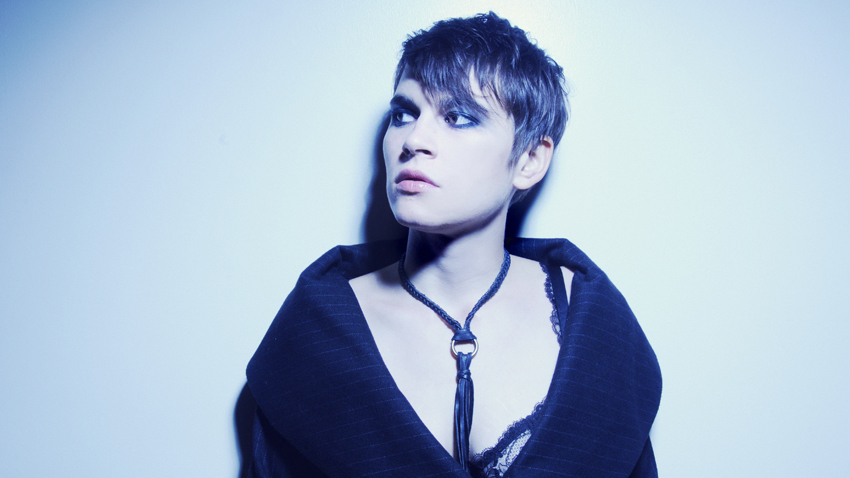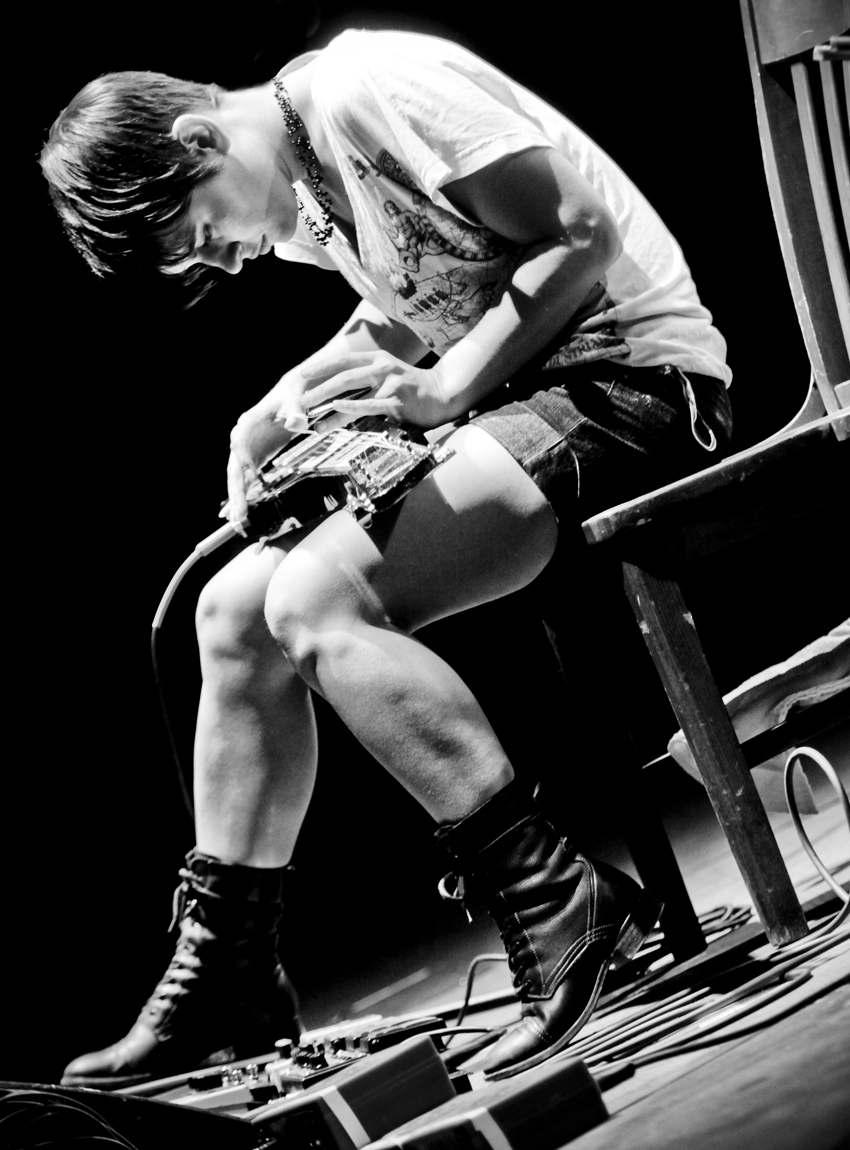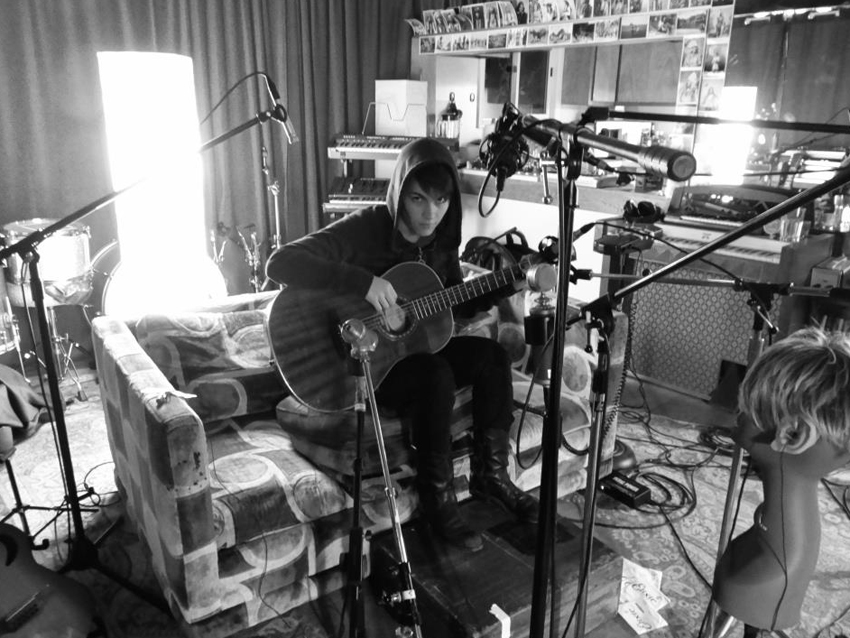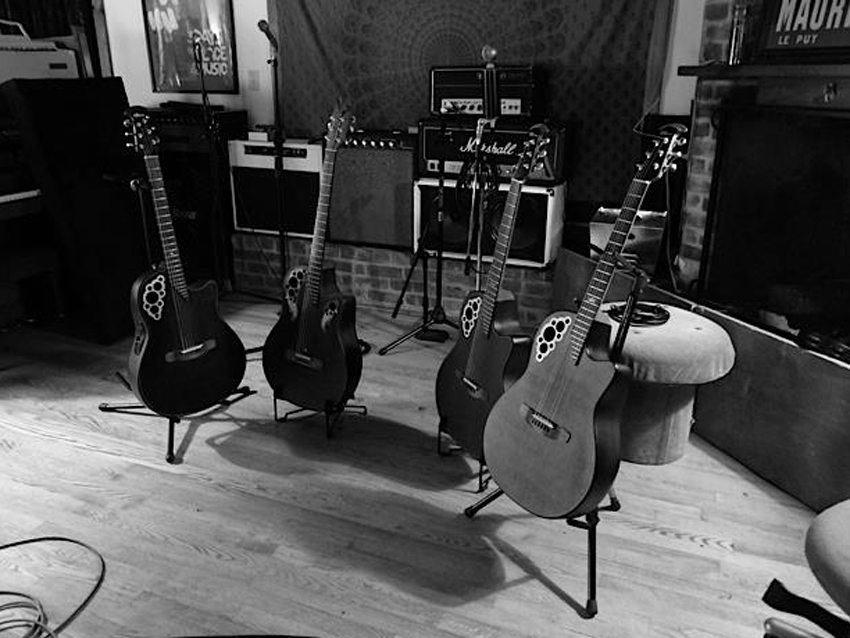
Since 2003, exultant critical praise has been a way of life for Kaki King, the devastatingly talented guitar virtuoso who has released eight blindingly brilliant studio albums and EPs. But several years ago, she received the kind of thumbs up from a fellow musician that ranks pretty high for total rock-star coolness.
"There are some guitar players that are good, and there are some guitar players that are really fucking good. And then there's Kaki King," head Foo Fighter Dave Grohl told a crowd at London's O2 arena in 2007, following King's opening act performance.
"That was a pretty funny and amazing thing," says King, recalling the onstage props. "By that point, I kind of knew Dave, so it was a lovely, fun, typically over-the-top comment from a friend. It wasn't like this rock god deemed me brilliant, but at the same time, it was a sincere compliment from a really nice guy. I was very touched."
The huzzahs and hosannahs are getting louder for King with the recent release of Glow, a transfixing and transporting set of instrumental originals that the guitarist recorded with producer D. James Goodwin. Augmenting King's dramatic, highly physical and idiosyncratic approach to the guitar is the New York City-based string quartet ETHEL, and the combination is a kinetic one, with songs such as Cargo Cult, The Fire Eater and Kelvinator, Kelvinator bursting with ethereal beauty, spacious melodies and multi-voiced string textures that form luscious beds of sonic enchantment.
Although it's a big time for King - a smashing new album, a triumphant new tour, and to top it all off, she's a newlywed (she married girlfriend Jessica Templin on 3 October) - it was only a couple of years ago that the guitarist grappled with self-doubt. "I had to re-assess my place in life and my commitment to music," she says. King sat down with MusicRadar to talk about getting music-making mojo back, the joys of alternate tunings and how she puts herself in a "microphone cage" to achieve the ultimate acoustic sound.
Although your other albums certainly quality, you characterize Glow as being a "guitar record." In what ways would you say you pushed yourself as a guitarist on the album?
"I think the main challenge for me was exploring some new tunings. I've always used a lot of open tunings, but it becomes the kind of thing where you get familiar with them. It becomes too easy to improvise with them. But when I started using the open D minor tuning, that immediately opened some new doors for me."
Get the MusicRadar Newsletter
Want all the hottest music and gear news, reviews, deals, features and more, direct to your inbox? Sign up here.
What are some of the tunings that you tend to use a lot?
"For me, the ubiquitous one is C-G-D-G-A-D. I'll sometimes use that as is or I'll go a half-step up or down. DADGAD's been a solid one. There's been some other ones over the years, but I'd say the C-G-D-G-A-D tuning has been on every record."
Do you find that you go into the same fingering patterns a lot? Like you said, the tunings become familiar…
"Yeah. That can be good because it's easy to improvise. That's why some of those songs are written in the tunings I know - I've spent a lot of time hanging out in there. My ears hear the notes, and my fingers know right where to go. That's great for playing live because you don't have to think; you can just go with the moment and play. But the downside is that you do get too comfortable, and the songs you write can start to sound a little samey. So, yeah, you have to shake it up."

King goes electric during her Traveling Freak Guitar Show in Rome, July 2011. © Simone Cecchetti/Corbis
How did you stumble across open D minor?
"I honestly can't remember. [Laughs] I was probably playing in open E minor. I rarely start in standard tuning, so it's hard to say. I guess I was in the open E minor, and I just turned it down a step. It's easier to play for some reason. I think the first thing I wrote with it was the beginning of Kelvinator, Kelvinator, the initial statement. Then I wrote Cargo Cult and Streetlight In The Egg - three totally different songs with incredibly different vibes, all with that tuning."
Wasn't D minor the "saddest of all keys" in Spinal Tap?
"I can't remember. [Laughs] Satirically, yes, I'm sure it is the saddest of all keys."
Let's talk about your approach to guitar playing. The various techniques you use, do they seem to come naturally to you? I know you've studied, but how much have formal lessons impacted what you do?
"I studied back in the day, when I was a teenager. I had an Alex de Grassi video - I think it was a Happy Traum joint. Remember those things? They were great. You'd get three entire songs completely broken down for you, every single part. You had the tab, and you had the guy who wrote the song explaining it for you. I did that with Alex de Grassi, Martin Simpson, Al Petteway - I became friendly with him. They were great videos.
"Then I met Preston Reed, and I went to the Swannanoa Gathering, but I really just kind of hung out and did drugs. [Laughs] I did play guitar, but I was pretty much interested in teenage things. Watching Preston, though, that flipped something in me. I went, 'Wow, this is something that speaks to me. This is what I really want to do.' I was about 18 then, I think."
It's hard to pick out the references in your playing. You're something of an impressionist on the guitar.
"Hmm, I like that. [Laughs] Thank you. I mean, I think you do hear Preston Reed in certain songs of mine. Kelvinator, Kelvinator sounds very Brazilian to me. On Cargo Cult, we kind of tipped our hats to Kate Bush and Running Up That Hill. The rhythm is doing a similar thing. So there are references, but they're not necessarily coming from guitar players.
"I don't know what Bowen Island speaks to, but King Pizel is very Celtic. At first I didn't want to let it be that, but then I just said, 'It is what it is. We don't have to try to make it any cooler.' [Laughs] That's when we got a bagpipe player."
Before you cut this album, you went through a difficult period, a lot of self-doubt. Were you just disillusioned by the music business? Were you actually thinking of packing it up?
"I don't think I ever thought I'd pack it up forever, but I did have to examine my life. We'd spent several years touring Junior, and it was a lot to deal with. The shows were incredible. I was doing these really big, long rock shows, and I had this amazing drummer and this guy who played unbelievable bass notes on a synthesizer-trumpet. It was epic and super-huge, and the shows were very physical for me. Between a lot of singing and playing a lot of complicated guitar while singing, and then I was jumping all around and diving into the audience - I think I was probably trying to kill myself. It's almost like I wanted to burn out.
"It's funny - I loved every minute of it, but the second it was over, I was done with it. At that point, it had not yet been a decade, but it was still a very long time that I'd been doing this. Plus, my sister got married, and I was swearing off love - I was going to be a bachelor forever [laughs]… I just had all of these stupid ideas about myself.
"I was thinking, Is there anything else I'd like to do? Because it's not easy being a musician; it's not easy being on tour and being away from my wife right now. After the initial fun and the accolades, there isn't much left. The only thing that's left is the music. I mean, I could win an award or make more money - things could happen, sure - but nothing is more meaningful than what I have as a musician. I had to remind myself of that fact - or be reminded.
"And I had to be reminded that the guitar is infinite. It never stops teaching you, it never stops being difficult; there's an unlimited amount of things to learn, and you'll never master it. It took me a while to be reminded of those wonderful things."
So it was a gradual process of rededicating yourself.
"Yeah, I didn't freak out or make any statements. I just took a pause for myself personally. I think everyone does that; it's just when I do it, everybody goes, 'Nooo! We love your music - you can't!' [Laughs] Nobody does that to the guy who works at the post office."

King tracks a guitar in her "microphone cage" at the Isokon in Woodstock, New York.
The album is as close to the pure sound of an acoustic as I've ever heard. How did you and D. James go about miking your guitars?
"We had a few different ways. Some of the songs were tracked at Mike Einzinger's studio in Malibu. With D. James, we're record the guitars in this little station I sort of built around myself. It's like a microphone cage! [Laughs] We dragged a couch into the middle of the room, but because I'm so short the couch wasn't tall enough for all the mics and the stands and everything, so I had to sit on these big pillows. It was pretty funny. D. James was changing mics around a lot.
"But the one thing I've always done, because I like the sound of my guitar from where I sit - meaning not in front of it - so what I do is, I put microphones around my ears. I have them around my head, too. I don't know if it's a superstitious thing, but it's actually how I recorded my first album. Everybody Loves You was recorded with a U-87 positioned directly in front of my face. That was a two-track record.
"The thing that I always tell engineers is, 'Come here. Come listen to what I hear.' Because that's the sound that I'm playing to - I'm not playing to the sound that's two feet in front of me. I think it's a circular relationship between how it sounds to me and how I play."
What was it like working with ETHEL - did they affect the way you wrote and arranged?
"Totally. Great Round Burn wasn't even a song; it was a jam. I wasn't even going to put it on the record. I think I had the B section, and I thought it was kind of cool. The Fire Eater was completely new, and I wrote it for ETHEL in three parts. Those were both written with the expressed intention of working with ETHEL on them."
Talk to me about the Veillette Gryphon High 12 guitar. How does that affect what you play and how you write? Is it easy to play? It looks so diminutive.
"Actually, it is easy to play. Joe Veilette, the luthier, lives in Woodstock, which was a happy, happy coincidence. Those guitars sound unbelievable. There's two songs on the record where I play it - Fences and King Pizel. Fences is a slow song, but what's funny is what a fast guitar the Veillette is. Your fingers just fly on it. It's like you have to get out of the way, you know? But I love it. The sound is marvelous. Dave Matthews uses it a lot, too."

A few of King's Ovation Adamas models waiting for duty in the studio.
And, of course, you have your own signature Ovation Adamas guitar. What were your specifications for the design?
"I had been playing the Deep Bowl Adamas model, and I know they treated the bracing differently because of my, uh… enthusiasm. [Laughs] They also tinkered with the preamp and made it very full at the bottom. Before I found the Gryphon and most of my career, I was so addicted to low sounds. I know we messed around with the wood of the bridge, and we ended up with a dyed walnut, which sounded the best. The other changes were cosmetic. The guitars are very busy visually, and I wanted to them clean them up and make them a little more symmetrical and simple. I'm not a fan of inlays, so we only have one at the twelfth fret.
"I have to say, I do love the Ovation guitars. If I had one guitar to play, it would be that one, and it's got nothing to do with having my name on it. I absolutely rely on it. My first record was done with an Ovation. The guitar has done for me what no other guitar has been able to do. They're not for everybody, but for me, they're essential. My Ovation is such a workhorse. I'm very lucky to have a guitar that matches what I want to do sound-wise."
Joe is a freelance journalist who has, over the past few decades, interviewed hundreds of guitarists for Guitar World, Guitar Player, MusicRadar and Classic Rock. He is also a former editor of Guitar World, contributing writer for Guitar Aficionado and VP of A&R for Island Records. He’s an enthusiastic guitarist, but he’s nowhere near the likes of the people he interviews. Surprisingly, his skills are more suited to the drums. If you need a drummer for your Beatles tribute band, look him up.
“I’m beyond excited to introduce the next evolution of the MT15”: PRS announces refresh of tube amp lineup with the all-new Archon Classic and a high-gain power-up for the Mark Tremonti lunchbox head
“These guitars travel around the world and they need to be road ready”: Jackson gives Misha Mansoor’s Juggernaut a new lick of paint, an ebony fingerboard and upgrades to stainless steel frets in signature model refresh










